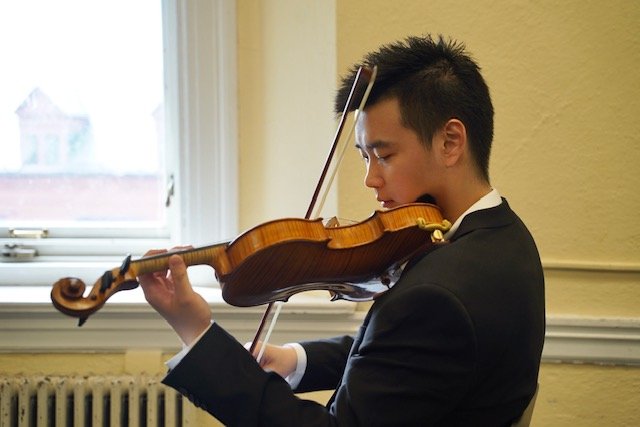Prestini, bruch, & schumann
Saturday, October 22, 2022, 8pm
All Saints Parish
1773 Beacon Street, Brookline, MA 02445
Tickets are $15 general admission, $10 for students and seniors, and free for children 12 & under.
COVID Policy: You do not need to show proof of vaccination or a negative test result to enter All Saints Parish. To ensure the safety of everyone, the members of Brookline Symphony Orchestra are fully vaccinated and we strongly recommend our audience members to wear a mask. Please stay home if you are sick or have COVID-19 symptoms; you have been directed to self-isolate or quarantine; or you are awaiting the results of a COVID-19 test. Note: These policies are subject to change as the COVID-19 pandemic and community transmission rates evolve.
Paola Prestini, The Hotel That Time Forgot
Composer Paola Prestini has collaborated with poets, filmmakers, and scientists in large-scale multimedia works that chart her interest in extra-musical themes ranging from the cosmos to the environment. She has created, written and produced large scale projects such as the largest communal VR opera, The Hubble Cantata, and the eco-documentary currently on PBS, The Colorado. As an immigrant, many identities, cultures, and values have collided and interlocked within her helping create a synthesis of both unique and universal ideas that naturally manifest into music. On a more granular level, folk melody is infused into the creation of original melodic lines that are deconstructed then supported with complex harmonies, rhythms, counterpoint and electronic worlds. Her work incorporates improvisation, live electronics, foley, and spatial elements. It is of the moment, political, ambitious, and always curious. Prestini is a Co-Founder of VisionIntoArt, a non-profit new music and interdisciplinary arts production company in New York City. She is also a Co-Founder/Artistic Director of the non-profit music organization National Sawdust. (https://www.paolaprestini.com/bio)
The Hotel That Time Forgot was commissioned by the American Composers Orchestra, and is originally accompanied by a film by Mami Kosemura. Notes from the composer:
Across the border from Syria in a forgotten Lebanese city sits the unexpected and historic building of The Grand Hotel Palmyra. I first became fascinated with the hotel when I came upon a video showing its interior, I become enamored, and began pouring into composing a sonic orchestral world to relive it’s memories. The hotel has not closed since it opened in 1874, even though war has raged just outside its doors. The owner Rima Husseini says “no one has a right to touch hotel Palmyra, except for time.” Through my personal identity of having immigrated from Italy as a child for a life on the border of Mexico and Arizona, writing The Hotel That Time Forgot became a vessel for a personal journey into the past, which has been surfacing through the current political and humanitarian crisis we see in the world today. The interaction of my musical impulses with visual inspiration has a natural gravitational pull towards large-scale work, so it was a joy to collaborate with the American Composers Orchestra and Mami Kosemura on this commission.
Max Bruch, Violin Concerto
with Concerto Competition winner Liyuan Xie
Max Bruch was a German Romantic composer. After initially studying philosophy and art, Bruch went on to have a long career as a teacher, conductor, and composer. At the height of his career he spent three seasons as conductor of the Liverpool Philharmonic Society and taught composition at the Berlin Hochschule für Musik from 1890 until his retirement in 1910. Bruch’s Violin Concerto is one of the most popular violin concertos in solo violin repertoire, and the composer’s most famous work. The concerto was first completed in 1866 and the first performance was given in 1866 by Otto von Königslow, with Bruch conducting. The concerto was then considerably revised with help from violinist Joseph Joachim and completed in its present form in 1867. Bruch also composed two more violin concertos, but neither has gained as much fame as his first.
Chinese born violinist Liyuan Xie has collaborated regularly with such orchestras as Shanghai Philharmonic, Shanghai Opera House symphony, Nanjing Philharmonic, Qingdao Symphony, Shanghai Chamber Orchestra, Novus Classica Camerata and many others since 10 years old. Recent solo appearances include performing Beethoven and Mendelssohn Violin Concerto with Nanjing Philharmonic Orchestra, All five Mozart Violin Concertos Marathon with NCC Orchestra and Vivaldi ‘Four Seasons’ concert. He also gave a recital tour this May in Music Mansion of Providence, Chandler Music Hall of Randolph Vermont, Trinity On Main Theatre of New Britain Connecticut. He has played as a guest violinist with the Boston Symphony Orchestra at Tanglewood Festival this summer. He is currently pursuing masters degree under Miriam Fried at the New England Conservatory.
Robert Schumann, Symphony No. 3
Robert Schumann was a German composer, pianist, and influential music critic. Schumann began to compose before the age of seven, with his early adulthood realizing a struggle between the worlds of studying law and music, until Schumann finally left the study of law at the age of 20 to officially pursue a career as a virtuoso pianist - but a hand injury ended this dream. Schumann then focused his energies on musical composition.
The Symphony No. 3 in E♭ major, Op. 97, also known as the “Rhenish”, is the last symphony composed by Robert Schumann. It premiered in 1851 in Düsseldorf, conducted by Schumann himself, and was received with mixed reviews. Although Schumann did not name the symphony himself, he conceded that it “perhaps reflects something of Rhenish life here and there.” Written shortly after his move to the Rhineland as municipal music director in Düsseldorf, the symphony's five movements portray scenes from the area - from festive and folksong-like themes to a solemn cathedral ceremony.


